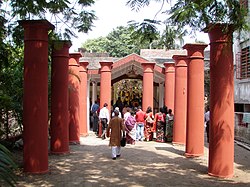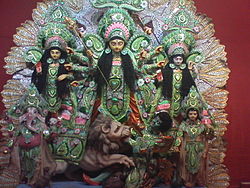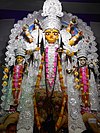Barowari
Barowari refers to the public organization of a religious entity, mainly in West Bengal, India. Barowari has significance associated with the Durga Puja festival.[clarification needed] The word "Barowari" comes from the Bengali words "baro", which means 12, and "yari", meaning a friendly connection.
In regional language, Barowari is often followed by the word Puja (Barowari Puja) which is when friends and families gather and contribute to a spiritual event.[1] In 1790, 12 Brahmin friends in Guptipara, Hooghly decided to institute a community Puja, and when the neighbours started to become suspicious, they started a "baro-yari" or Barowari Puja in Bengal, which gained much popularity among the neighbors. Eventually, this occasion gained popularity across West Bengal.[2] Initially, Durga Puja was an occasion for the rich Babus of Kolkata. Later, individual initiatives declined as collective enterprises came to replace it.[citation needed]
In more recent times, the terminology 'barowari' is being replaced by 'sorbojanin' (meaning 'all-inclusive'). The Barowari festival is often organized to allow the participation of outsiders. The Barowari festival is held with funds raised from the public at large through donations or subscriptions.[3]
Etymology[edit]
The first publicly organized Durga Puja was held at Guptipara, when several men were stopped from taking part in a household Durga Puja. Twelve of them formed a committee and organized the Durga Puja. There is a difference of opinion about the year of worship – 1761 or 1790.[4][5]
History[edit]
There were numerous household Durga Puja's conducted in various parts of Bengal. Generally, such pujas allowed the general public to worship and the arrangements were taken care by the family who takes the initiative and spends money on it.

The Sabarna Roy Choudhury family has been celebrating Durga Puja since 1610 in their ancestral home at Barisha. Durga Puja is possibly one of the oldest and the largest organized festivals of West Bengal. Every year, seven Durga Pujas are being held by the family. Out of these, six are held at Barisha while the seventh is at Birati. The Pujas, which are held at Barisha, are Aatchala, Baro Bari, Mejo Bari, Benaki Bari, Kalikingkar Bhawan, and Majher Bari. Other than Durga Puja, the family also organizes Chandi Puja, Jagaddhatri Puja, Dol Yatra, and Rath Yatra Utsav.[6][7]
The Dutta Chaudhury Zamindar family, of Andul, started conducting Durga Puja in the year of 1609 by Kashiwar Dutta Chaudhury. However, elder family members residing in Andul have indicated that they used to worship Mother Durga in an "Achala" structure since the 15th century, possibly started by Tekari Dutta (Founder of the Dutta Chaudhury Zamindari in Andul). This is according to their family history, which has been passed down the generations as a legend. Animal sacrifices following Tantric requirements used to be carried out during the earlier days, until it was stopped when Krishnananda Dutta became a full-fledged 'Vaishnav' due to the influence of Chaitanya Mahaprabhu and Nityananda Prabhu. Eventually, it was Kashiswar Dutta Chaudhury who, with the help of the Mughal Emperor Shah-Jehan, was able to recover from his uncle (Gobindasharan Dutta- founder of the Hatkhola Dutta family) most of what was taken. He reinstated the Andul zamindari to its former glory. He re-established the traditional worship of goddess Durga in the year 1609 AD at a new Chandi-mandap, following Brihat Nandikeshwar Puran and according to Vaishnav rituals. It is considered to be one of the oldest Durga Puja in West-Bengal.

Nabakrishna Deb started the Durga Puja in Shobhabazar Rajbari in 1757. He set a pattern for the puja, which became a fashion and status symbol among the upcoming merchant class of Kolkata. The number of Englishmen attending the family Durga Puja became an index of prestige. The nautch girls were mostly from Muslim gharanas. The Englishmen attending the dance-parties dined on beef and ham from Wilson's Hotel and drank to their hearts' content.[8]
Rani Rashmoni used to celebrate Durga Puja at her residence with traditional pomp, including all-night jatras (IAST: jatras)
(folk theatre), rather than by entertaining the Englishmen with whom she carried on a running feud. After she died in 1861, the sons-in-law took to celebrating Durga Puja in their respective premises.[9]
There are several other famous households Durga Pujas in Kolkata.
Barowari Durga Puja[edit]
The twentieth century witnessed the emergence of community Durga Puja which was also at times organized publicly. The first Barowari Durga Puja was organized in Kolkata by Bhowanipore Sanatan Dharmotsahini Sabha in 1909 at Balaram Bose Ghat Road, Bhowanipore. On this occasion, Sri Aurobindo published the famous Durga Stotra in his Bengali journal, Dharma, issue one "Kartika" dated 1316 AD.
J.C. Nixon, in his "Account of the Revolutionary organizations in Bengal" noted: "Bhowanipore Party: owing to his striking personality, Jatindra Nath Mukharji was during this period gaining great popularity and esteem in anarchic circles. There is evidence for believing that the murderer of Babu Ashutosh Biswas, Public Prosecutor, on 10 February 1909, was a member of this party, while there is no doubt that Jatin Mukharji himself was one of the instigators of the murder of Khan Bahadur Shamsul Alam which took place on 21 February 1910."[10]
Other Barowari Durga Puja that followed were the College Street Tamer Lane Sarbojanin Durga Utsav of 1915, Shyampukur Adi Sarbojanin of 1911,[11] Sikdar Bagan (in the Shyambazar neighbourhood) of 1913, Nebubagan, which in 1919 became Bagbazar sarbojanin, Simla Byam Samiti of 1926[12] and Amherst Street Lohapatty Sarbojanin of 1943, which later became Maniktala Chaltabagan Lohapatty Durga Puja.
Presently, the Barowari Durga Pujas are celebrated in over 2,000 pandals in Kolkata.[13]
References[edit]
- ↑ "Welcome To Durgapujas.com & Puja Schedules". Calcutta: E-sol. Archived from the original on 11 September 2010. Retrieved 1 November 2010.
- ↑ Citation needed?
- ↑ "North Kolkata's Old 'Barowaari' Durga Pujas Are Now Turning To Theme". www.ndtv.com. NDTV. Retrieved 29 July 2020.
- ↑ Calcutta Web Archived 12 April 2007 at the Wayback Machine
- ↑ Festivals – Durga Puja
- ↑ " Bangiya Sabarna Katha Kalishetra Kalikatah" by Bhabani Roy Choudhury, Lua error in Module:Lang at line 1807: attempt to call method 'gsub' (a nil value)., Manna Publication. ISBN 81-87648-36-8
- ↑ Sabarna Prithivi – website of the Sabarna Roy Choudhury family
- ↑ Jaya Chaliha and Bunny Gupta, "Durga Puja in Calcutta" in "Calcutta The Living City" Vol II, edited by Sukanta Chaudhuri, Oxford University Press, first published 1990, paperback edition 2005, pp 332–333. ISBN 0-19-563697-X
- ↑ Chaliha, Jaya and Gupta, Bunny, "Durga Puja in Calcutta", in "Calcutta, the Living City", Vol. II, edited by Sukanta Chaudhuri, first published 1990, 2005 edition, pp. 334–335, Oxford University Press, ISBN 0-19-563697-X.
- ↑ Samanta, Amiya K. (1995). Terrorism in Bengal: General trend of the terrorist movement in Bengal from 1907-1939. Government of West Bengal.
- ↑ "Shyampukur Adi Sarbojanin Durgotsab". Committee, 22, Ramdhan Mitra Lane, Kolkata 700004 by Soumendra Nath Thakur. Archived from the original on 14 July 2011. Retrieved 1 November 2010.
- ↑ Kolkata kaccha – Sekaler Durga Puja, Ananda Bazar Patrika, Lua error in Module:Lang at line 1807: attempt to call method 'gsub' (a nil value)., 15 October 2007
- ↑ Gandhi, Maneka. "Think Again:Crime and No Punishment". 8th Day. The Statesman, 13 January 2008. Retrieved 13 January 2008. [dead link]
- Sarbojanin Dharma Prasarini Samity Durga Puja 1922 Bhowanipur


